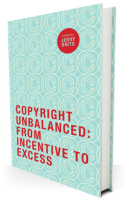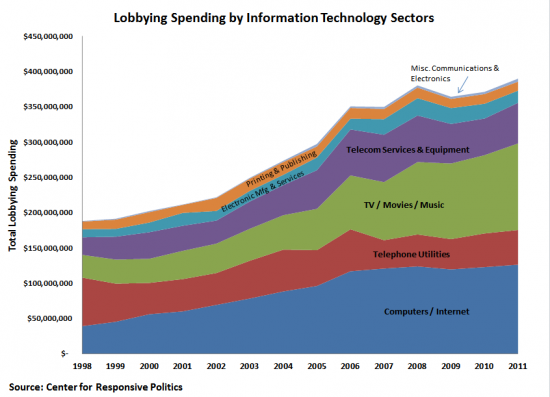This morning, I’m gearing up for Thursday’s noon-time Cato book forum on the Mercatus/Jerry Brito book, Copyright Unbalanced: From Incentive to Excess.
With the recent release and withdrawal of a Republican Study Committee memo on copyright policy, there is even greater tension around the issues than usual. So here’s a line from the planning email I sent to panelists Jerry Brito, Tom W. Bell, and Mitch Glazier.
Given how hot the issues we’ll discuss tend to be, I’ll emphasize that we’re all friends through the transitive property of friendship. I’ll be policing against ad hominem and stuff like that coming from any side. In other words, don’t bother saying or implying why a co-panelist thinks what he does because you don’t know, and because I’ll make fun of you for it.
It might be worth coming just to see how well I do with my moderation duties. Whatever the case, I think our panelists will provide a vibrant discussion on the question of where libertarians and conservatives should be on copyright. Register here now.

After almost a year in the making, I’m happy to announce today that the new book I’ve edited, Copyright Unbalanced: From Incentive to Excess is now available. The book is not a moral case for or against copyright; it is a pragmatic look at the excesses of the present copyright regime from a free-market, limited government perspective.
Given the recent debate sparked by the retracted RSC copyright memo, it’s important that we make the case that respect for property rights, including intellectual property, is not incompatible with criticism of the sometimes cronyist copyright system that we have today. Conservatives and libertarians, who are naturally suspicious of big government, should be skeptical of our ever-expanding copyright system. They should also be skeptical of the recent trend toward criminal prosecution of even minor copyright infringements, of the growing use of civil asset forfeiture in copyright enforcement, and of attempts to regulate the Internet and electronics in the name of piracy eradication. These are the issues Copyright Unbalanced addresses.
Contributors include yours truly, Reihan Salam, Patrick Ruffini, David G. Post, Tim Lee, Christina Mulligan, Eli Dourado and Tom W. Bell. It’s an amazing line-up of thoughtful essays. The book is available at Amazon.com, although the Kindle ebook version will be out in a couple of days. There is also a book website where you can learn more about the book and read the first chapter, “Why Conservatives and Libertarians Should Be Skeptical of Congress’s Copyright Regime.” And here is a wonderful write-up of our book for Bloomberg by Virginia Postrel.
Also, I will be speaking at several copyright events in the next two weeks. These are all open to the public and I hope you will be able to attend.
- The State of Copyright Law and Where to Start to Fix It, hosted by Public Knowledge, Tuesday, December 4, 2012, 2:00 PM – Rayburn House Office Building
- Book Forum for Copyright Unbalanced, hosted by the Cato Institute, Thursday, December 6, 2012, 12:00 PM
- CopyRIGHT: Can Free Marketeers Agree On Copyright Reform?, hosted by TechFreedom, Dec. 13, 2012, 3:00 PM, U.S. Capitol
A special thanks goes out to the contributors, who made the book possible, and to the staff of the Mercatus Center who made it a reality. The moment is ripe for copyright reform and for conservatives and libertarians to take leadership on the issue. I hope we can make a constructive contribution to that effort.
I caught this tidbit today in a Washington Post article about Julius Genachowski’s tenure as Federal Communications Commission chairman:
He wound up presiding over a crucial period in which the powerful companies of Silicon Valley turned into Washington power players. Lobbying the FCC has become a major economic franchise. Each day, hundreds of dark-suited lawyers crowd the antiseptic, midcentury-modern agency building.
Can anyone think this is a good thing? To be clear, I don’t think Genachowski is solely responsible for Silicon Valley innovators getting more aggressive in Washington or for tech lobbying becoming “a major economic franchise” at the FCC. There’s plenty of blame to go around in that regard. Regardless, every legislative and regulatory action that opens the door to greater regulation of the information economy also opens the door a bit wider to unproductive rent-seeking and cronyist activities. Moreover, every minute and every dollar spent focusing on making legislators and regulators happy is another minute and dollar that could have better been spent making consumers happy in the marketplace. It’s a pure deadweight loss to society.
And there has been a remarkable expansion in such tech lobbying activity over the past decade, as the following charts illustrate. The first shows the dramatic growth of lobbying by computer and Internet companies relative to other sectors and the second shows lobbying spending by specific computer and Internet companies. [Click to enlarge.]

Continue reading →



 The Technology Liberation Front is the tech policy blog dedicated to keeping politicians' hands off the 'net and everything else related to technology.
The Technology Liberation Front is the tech policy blog dedicated to keeping politicians' hands off the 'net and everything else related to technology.